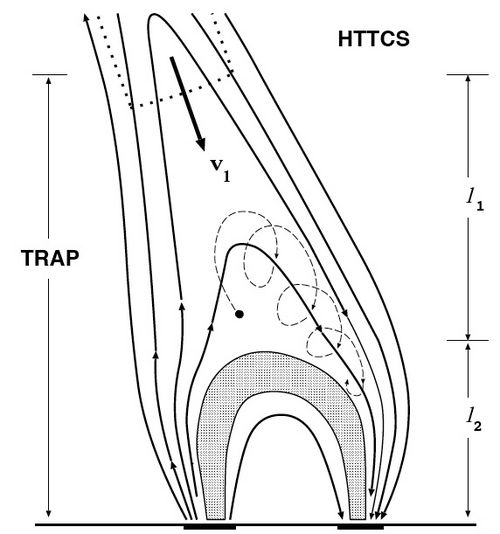Collapsing Traps
From RHESSI Wiki
(Started draft of new Nugget) |
(Section I drafted) |
||
| Line 13: | Line 13: | ||
The coronal magnetic field can undergo large-scale restructurings during a flare or CME. | The coronal magnetic field can undergo large-scale restructurings during a flare or CME. | ||
| + | If this restructuring happens [[http://en.wikipedia.org/wiki/Guiding_center adiabatically]], i.e. on scales large compared with the | ||
| + | [[http://en.wikipedia.org/wiki/Larmor_radius Larmor motion]] of the particles in question, they can gain or lose energy. | ||
| + | A "collapsing trap" is exactly the sort of geometry expected from large-scale magnetic reconnection, and so this concept provides a basic mechanism for particle acceleration in a flare or CME. | ||
| + | The sketches in Figure 1 show how this might work. | ||
| + | There is a lot more detail than needed in the sketches; basically on the left one sees a reconnected magnetic field line "dipolarizing" rapidly, and on the left slowly. | ||
| + | This process is the basic element of the standard reconnection models of solar flares, as explained copiously elsewhere among the Nuggets (for example, [[http://sprg.ssl.berkeley.edu/~tohban/nuggets/?page=article&article_id=40 here]]. | ||
| + | |||
| + | [[Image:trap_cartoon.jpg|500px|thumb|center| Two views of the collapsing magnetic trap following large-scale reconnection. The longer arrows show the field deforming, so rapidly on the left as to induce a fast-mode shock wave ("SW") and more slowly on the right.]] | ||
| + | |||
| + | ==Betatron vs First-order Fermi Acceleration== | ||
| + | |||
| + | ==Some Data== | ||
| + | |||
| + | ==Conclusion== | ||
Revision as of 15:33, 18 January 2009
| Nugget | |
|---|---|
| Number: | 94 |
| 1st Author: | Boris Somov |
| 2nd Author: | Hugh Hudson |
| Published: | 19 January 2009 |
| Next Nugget: | A Quantum of Solar |
| Previous Nugget: | RHESSI_Simulations_of_Complicated_Flares |
| List all | |
Contents |
Introduction
The coronal magnetic field can undergo large-scale restructurings during a flare or CME. If this restructuring happens [adiabatically], i.e. on scales large compared with the [Larmor motion] of the particles in question, they can gain or lose energy. A "collapsing trap" is exactly the sort of geometry expected from large-scale magnetic reconnection, and so this concept provides a basic mechanism for particle acceleration in a flare or CME. The sketches in Figure 1 show how this might work. There is a lot more detail than needed in the sketches; basically on the left one sees a reconnected magnetic field line "dipolarizing" rapidly, and on the left slowly. This process is the basic element of the standard reconnection models of solar flares, as explained copiously elsewhere among the Nuggets (for example, [here].
Betatron vs First-order Fermi Acceleration
Some Data
Conclusion
| RHESSI Nugget Date | 19 January 2009 + |
| RHESSI Nugget First Author | Boris Somov + |
| RHESSI Nugget Index | 94 + |
| RHESSI Nugget Second Author | Hugh Hudson + |
